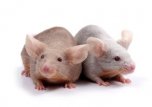Mice
Mice are nocturnal so are more active at night. Mice are naturally active animals and should be provided with enrichment and exercise wheels to prevent obesity and boredom.
Card board tubes make ideal enrichment for the mouse to play in, climb in and gnaw.
Mice will often climb the inside of the cage so care must be taken to ensure all doors are securely closed.
The need to be housed with, or apart from, other animals
Mice are social animals and should be housed in single sexed pairs or groups to prevent unwanted offspring. As mice can breed from two months it is essential youngsters are sexed and separated early.
The need to be protected from pain, suffering, injury and disease By providing a suitable diet and clean accommodation the mouse will be less likely to develop
some diseases and disorders.
To ensure mouse do not experience pain when being handled they should be handled
correctly.
HOUSING
Providing the mouse with safe, suitable accommodation which is
clean, comfortable, secure and has appropriate environmental
conditions, including temperature, ventilation and drainage.
A large cage with a deep plastic base is ideal for mice. Some mice
are very small and agile, so the bars of the cage should be less than
9mm apart to prevent escape.
The cage should contain a suitable floor covering (substrate) such as dust free wood shavings or
chopped straw. Nesting material should be provided in one corner of the cage, this can be inside
a small house or carboard box.
Fresh water should be constantly available, a water bottle is recommended as the water in bowls
can become easily contaminated.
Mice are susceptible to changes in temperature and the accommodation should be kept
constant, between 17oC and 23oC. If the temperature rises above 30oC a mouse may suffer
from heat stroke.
Mice urinate very frequently. The accommodation should be cleaned out twice a week to prevent
the buildup of ammonia and bacteria. Animal safe disinfectants should be used.
FEEDING AND WATER
Like most rodents, mice are omnivores and can eat a variety of foods, but the introduction of
new foods should be gradual to prevent digestive upset.
A variety of specialist mouse diets are available containing seeds, grains, nuts and commercially
manufactured biscuits, these have been manufactured to provide mice with a nutritionally
balanced diet.
Mice require no more than a teaspoon of food each day. The diet can also be supplemented by
very small amounts fruit or vegetables and the occasional dog biscuit.
Cheese is not recommended as a regular food source, although small amounts can be provided
as occasional treats.
Fresh water must always be available.
HANDLING
Fancy mice can be picked up by cupping them or by the base of their tail, picking
them up by any other part of the tail will cause discomfort and injury.
Spiny mice must not be picked up by the tail.
GENERAL CARE
Should the mouse become ill providing suitable care and where necessary veterinary
treatment is essential. Some common mouse conditions are:
• Respiratory diseases – symptoms include coughing, sneezing, and discharge
from the eyes and nose.
• Lumps and growths – there are a number of causes including abscesses, fatty
lumps and tumors

Shopping List
- Cage/housing unit
- Mineral block
- Food
- Litter
- Bedding
- Food dish
- Food
- Water bottle and bottle brush
- Gnaw block
- Treats
- Toys
- Book on mouse care
